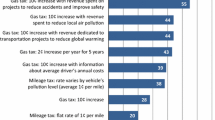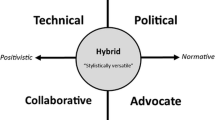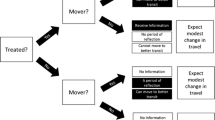Abstract
Can information increase public support for transportation reform? To understand the associations between knowledge, policy preferences, and information campaigns, we conducted a survey experiment of 597 U.S. adults, including an initial survey and a six-month follow-up. We focus on transportation policies that have high support for the status quo and whose corresponding essential facts are generally misunderstood: congestion relief (induced demand) and transportation finance (funding shortfall). We find that traffic dynamics are poorly understood, that misunderstandings are closely associated with preferences about congestion relief, and that exposure to information about induced demand meaningfully decreases support for road widening. The results differed for transportation finance: while providing information increased support for raising the gas tax, relevant knowledge was already widespread and was not closely associated with policy preferences. Providing information did not lead to long-lasting effects for congestion or finance. In both cases, support for reform reverted to initial levels after six months. Ultimately, the results offer room for both optimism and caution. Information campaigns may effectively shift perceptions, particularly if underlying facts are poorly understood and closely linked to policy preferences. However, planners must remain persistent—a single exposure to new information will be insufficient to change hearts and minds.


Similar content being viewed by others
Data availability
Available at OSF https://osf.io/kchsb.
Code availability
Available at OSF https://osf.io/kchsb.
Notes
The initial preregistration includes the original survey (October 2020) but does not include the follow-up survey (April 2021), since we did not initially plan to do one. We submitted a second preregistration prior to fielding the follow-up survey. Both preregistrations are embargoed until July 2021.
References
Aguilar, S.J., Polikoff, M.S., Sinatra, G.M.: Refutation texts: a new approach to changing public misconceptions about education policy. Educ. Res. 48(5), 263–272 (2019)
Althaus, S. L.: Information effects in collective preferences. Am. Polit. Sci. Rev. 545–58 (1998)
Beker, K., Kim, J., Van Boekel, M., van den Broek, P., Kendeou, P.: Refutation texts enhance spontaneous transfer of knowledge. Contemp. Educ. Psychol. 56, 67–78 (2019)
Börjesson, M., Hamilton, C.J., Näsman, P., Papaix, C.: Factors driving public support for road congestion reduction policies: congestion charging, free public transport and more roads in Stockholm, Helsinki and Lyon. Transp. Res. Part A Pol. Pract. 78, 452–462 (2015)
Burstein, P.: The impact of public opinion on public policy: a review and an agenda. Polit. Res. Q. 56(1), 29–40 (2003)
Demsas, J.: How to Convince a NIMBY to Build More Housing. Vox. February 24, (2021). https://www.vox.com/22297328/affordable-housing-nimby-housing-prices-rising-poll-data-for-progress
Downs, A.: The law of peak-hour expressway congestion. Traffic Quart. 16 (3) (1962). http://trid.trb.org/view/694596
Duranton, G., Turner, M.A.: The fundamental law of road congestion: evidence from US Cities. Am. Econ. Rev. 101(6), 2616–2652 (2011). https://doi.org/10.1257/aer.101.6.2616
Farber, S.: A generation of congestion. The Toronto Star, February 26, ONT edition, sec. Opinion (2021)
Flay, B.R.: Selling the smokeless society : 56 evaluated mass media programs and campaigns worldwide. American Public Health Association, Washington, DC (1987)
General Social Survey: 2018 General Social Survey (2018)
Guzzetti, B.J.: Learning counter-intuitive science concepts: What have we learned from over a decade of research? Read. Writ. Q. 16(2), 89–98 (2000). https://doi.org/10.1080/105735600277971
Jaffe, E.: The surprising politics of traffic solutions. CityLab, (2014)
Klein, N. J., Ralph, K., Thigpen, C., and Brown, A.: Political partisanship and transportation reform. J. Am. Plann. Assoc. 1–16 (2021)
Klein, N., Ralph, K., Thigpen, C., and Brown, A.: Americans’ Views of US Transportation Policy - 6 Month Follow-Up. OSF. April 14, (2021). https://osf.io/h74gr.
Kreuter, M.W., Wray, R.J.: Tailored and targeted health communication: strategies for enhancing information relevance. Am. J. Health Behav. 27(1), S227–S232 (2003)
Ladd, B.: ‘You can’t build your way out of congestion’. – Or can you? DisP Plan. Rev. 48(3), 16–23 (2012). https://doi.org/10.1080/02513625.2012.759342
Lederman, J., Brown A., Taylor, B. D., and Wachs, M.: Lessons learned from 40 years of local option transportation sales taxes in California. Transportation Research Record, 0361198118782757 (2018)
Lin, J.-W., Yen, M.-H., Liang, J., Chiu, M.-H., Guo, C.-J.: Examining the factors that influence students’ science learning processes and their learning outcomes: 30 years of conceptual change research. Eurasia J. Math. Sci. Technol. Educ. 12(9), 2617–2646 (2016)
Luke, R., Heyns, G.: Public transport policy and performance: the results of a South African public opinion poll. J. Transp. Supply Chain Manag. 7(1), 1–8 (2013)
Lupia, A.: Uninformed: why people know so little about politics and what we can do about it. Oxford University Press (2016)
Madajewicz, M., Pfaff, A., Van Geen, A., Graziano, J., Hussein, I., Momotaj, H., Sylvi, R., Ahsan, H.: Can information alone change behavior? Response to arsenic contamination of groundwater in Bangladesh. J. Dev. Econ. 84(2), 731–754 (2007)
Mangan, E.: Stop funding transit like it’s 1982, Congress. Transportation for America (blog). (2020). https://t4america.org/2020/04/14/stop-funding-transit-like-its-1982-congress/
Manville, M.: In congestion pricing fair to the poor? 100 Hours, (2017). https://medium.com/100-hours/is-congestion-pricing-fair-to-the-poor-62e281924ca3
Manza, J., and Cook, F. L.: The impact of public opinion on public policy. In: Navigating public opinion: polls, policy, and the future of american democracy, edited by Jeff Allen, Fay Lomax Cook, and Benjamin I Page, 17–32 (2020a). Oxford: Oxford University Press
Manza, J., Cook, F.L.: A Democratic polity?: Three views of policy responsiveness to public opinion in the United States. Am. Polit. Res. 30(6), 630–667 (2020b). https://doi.org/10.1177/153267302237231
Murre, J.M.J., Dros, J.: Replication and analysis of Ebbinghaus’ forgetting curve. PLoS ONE 10(7), e0120644 (2015)
Nall, C.: The road to inequality: how the federal highway program polarized America and undermined cities. Cambridge University Press, Cambridge, United Kingdom (2018)
Noland, R.B., Lem, L.L.: A review of the evidence for induced travel and changes in transportation and environmental policy in the US and the UK. Transp. Res. Part D Transp. Environ. 7(1), 1–26 (2002). https://doi.org/10.1016/S1361-9209(01)00009-8
Palan, S., Schitter, C.: Prolific.Ac—a subject pool for online experiments. J. Behav. Exp. Financ. 17(March), 22–27 (2018). https://doi.org/10.1016/j.jbef.2017.12.004
Pinker, S.: The sense of style: the thinking person’s guide to writing in the 21st century. Penguin Books (2015)
Ralph, K., Klein, N., Thigpen, C., and Brown, A.: Americans’ views of US transportation policy. OSF. October 14, (2020). https://osf.io/kchsb
Ray, J., Fleming, B., Higashide, S., Mangan, E., Lample, K., Lillehei, X., Noisecat, J., McElwee, S., and Cohen, D. A.: Voters want a better transit system for America. Data for Progress (2020). http://t4america.org/wp-content/uploads/2020/03/Transit-Polling-Memo-final.pdf
Shwom, R., Dan, A., Dietz, T.: The effects of information and state of residence on climate change policy preferences. Clim. Change 90(4), 343–358 (2008)
Sinatra, G.M., Broughton, S.H.: Bridging reading comprehension and conceptual change in science education: the promise of refutation text. Read. Res. Q. 46(4), 374–393 (2011)
Tax Policy Center: what is the highway trust fund, and how is it financed?, (2021). https://www.taxpolicycenter.org/briefing-book/what-highway-trust-fund-and-how-it-financed
Tippett, C.D.: Refutation text in science education: a review of two decades of research. Int. J. Sci. Math. Educ. 8(6), 951–970 (2010). https://doi.org/10.1007/s10763-010-9203-x
US Census Bureau: 2019 5-Year American Community Survey (2019)
Volker, J., Lee, A., and Handy, S.: environmental reviews fail to accurately analyze induced vehicle travel from highway expansion projects, (2021). https://doi.org/10.7922/G21N7ZF7
Wantland, D.J., Portillo, C.J., Holzemer, W.L., Slaughter, R., McGhee, E.M.: The effectiveness of web-based vs. non-web-based interventions: a meta-analysis of behavioral change outcomes. J. Med. Internet Res. 6(4), e40 (2004)
Zipper, D.: The unstoppable appeal of highway expansion. Bloomberg.Com. September 28, (2021). https://www.bloomberg.com/news/features/2021-09-28/why-widening-highways-doesn-t-bring-traffic-relief
Acknowledgements
This work was supported by a Kvarsten Faculty Development Grant from the University of Oregon. We thank the following for their feedback on the survey instrument: Suzanne Lanyi Charles, Brianne Eby, Dillon Fitch, Susan Handy, Amanda Howell, Evan Iacobucci, Jaekyeong “Jamie” Kwon, Rebecca Lewis, Michael Manville, Pat Mokhtarian, Eric Morris, Bob Noland, Matthew Palm, Linda Shi, and Robert Schneider.
Funding
Kvarsten Faculty Development Grant, University of Oregon.
Author information
Authors and Affiliations
Contributions
All authors contributed to the study: conceiving and designing the research, collecting and analyzing the data, and writing the manuscript. All authors read and approved the final manuscript.
Ethics declarations
Conflict of interest
On behalf of all authors, the corresponding author states that there is no conflict of interest.
Additional information
Publisher's Note
Springer Nature remains neutral with regard to jurisdictional claims in published maps and institutional affiliations.
Rights and permissions
About this article
Cite this article
Thigpen, C., Ralph, K., Klein, N.J. et al. Can information increase support for transportation reform? Results from an experiment. Transportation 50, 893–912 (2023). https://doi.org/10.1007/s11116-022-10265-0
Accepted:
Published:
Issue Date:
DOI: https://doi.org/10.1007/s11116-022-10265-0




